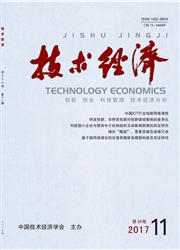

 中文摘要:
中文摘要:
产业集群最主要的生产特点是将某一特定的最终消费品制造过程分解为众多的中间产品(零部件)的制造环节,并分别由专业化程度很高的企业进行生产和组装,企业之间基本上遵循市场竞争规则进行中间产品的交易,其本质特点是在企业之间进行知识分割,以获得最优的生产效率和创新效率,但企业之间知识分割亦可能产生一定程度不同类型的知识风险,包括知识同质风险、知识依赖风险和知识匹配风险。因此,企业之间知识分割状态及其变动趋势,影响和决定着产业集群的演化,其过程大致可以分为起始阶段、形成阶段、扩展阶段和成熟阶段。
 英文摘要:
英文摘要:
The important trait of industrial clusters is that the course of production of the end consumptive goods is decomposed some manufacture taches for the middle products, that are produced and assembled by those specialized firms, and the trade of the middle goods between firms must follow the rule of market competition. The substantial characteristic of industrial clusters is to gain more efficiency for production and innovation by the knowl- edgepartitioning in the interfirm. But the knowledge partitioning may partly cause kinds of knowledge risk, including knowledge homogeneity risk, knowledge dependence risk, and knowledge matching risk. The evolution of industrial clusters is determined by the knowledge partitioning and its changing direction in the interfirm, and the course of evolution is divided into four phases, including startup, forming, extending, and maturing.
 同期刊论文项目
同期刊论文项目
 同项目期刊论文
同项目期刊论文
 期刊信息
期刊信息
